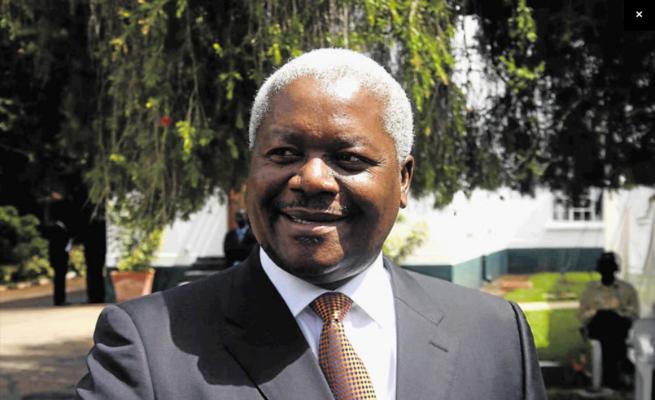News / National
Chombo loses court challenge
21 May 2024 at 07:28hrs |
0 Views

Former cabinet minister Ignatius Chombo has lost his bid to prevent Agriculture Minister Anxious Masuka from subdividing his Allan Grange Farm in Zvimba, which spans over 3,000 hectares, to accommodate other farmers, including his ex-wife Marian.
High Court judge Justice Jacob Manzunzu ruled that the reasons provided by Minister Masuka for canceling the lease were valid and within his authority.
"The role of the minister in the tripartite agreement was to ensure the joint venture was approved by the government. Such an agreement could not have intended to oust the minister's role in managing the land reform program," stated Justice Manzunzu.
"For the reasons already stated in this judgment, this is not a proper case for the court to exercise its discretion in favor of granting the declaratory orders sought." The judge ordered Chombo to pay costs on an ordinary scale.
Marian, Chombo's ex-wife, joined the court proceedings through a court order in 2022. Chombo, who had occupied the farm for over two decades under a 99-year lease, sought a declaratory order that the minister could not cancel his lease outside the provisions of clause 22.1. He also sought to have Masuka's reasons for the cancellation declared illegal and void.
Chombo signed the 99-year lease with the government on November 14, 2006, during his marriage to Marian. The farm was designated for agricultural and pastoral use, with any other uses requiring ministerial consent.
In March 2018, Chombo entered into a tripartite agreement with an investor, Pepary Investments (Private) Limited, and the government. However, on June 21, 2021, the minister informed Chombo of his intention to cancel the lease. Chombo responded on August 13, 2021, with representations urging the minister not to proceed with the cancellation. Despite this, the lease was canceled on September 21, 2021, with the notification reaching Chombo on January 17, 2022.
Chombo argued that Masuka acted outside the bounds of clause 22.1 of the lease agreement, rendering his actions illegal. Both Marian and Masuka defended the minister's decision, stating that the lease agreement was eventually canceled, and the application was based on an intention to cancel.
The court heard that the cancellation aimed to restore Marian's rights as a joint leaseholder following their divorce and to re-plan the farm to accommodate other settlers.
In his opposition, Minister Masuka argued that the farm's size allowed for subdivision while maintaining agricultural viability. He noted that Marian continued to reside on the farm but was deprived of agricultural rights. He emphasized that repossession required the lease's cancellation first.
"The provisions of clause 22.1 of the lease agreement are permissive and apply in cases where the lease is canceled entirely. In this case, the intention is to partially repossess portions of the land for the reasons outlined in my letter," argued Masuka.
The minister indicated that Chombo would be offered a new tenure document for 500 hectares, consistent with the reasons for the lease cancellation.
The judge upheld the minister's arguments, stating that the tripartite agreement did not diminish the minister's administrative powers over the land as per the law.
High Court judge Justice Jacob Manzunzu ruled that the reasons provided by Minister Masuka for canceling the lease were valid and within his authority.
"The role of the minister in the tripartite agreement was to ensure the joint venture was approved by the government. Such an agreement could not have intended to oust the minister's role in managing the land reform program," stated Justice Manzunzu.
"For the reasons already stated in this judgment, this is not a proper case for the court to exercise its discretion in favor of granting the declaratory orders sought." The judge ordered Chombo to pay costs on an ordinary scale.
Marian, Chombo's ex-wife, joined the court proceedings through a court order in 2022. Chombo, who had occupied the farm for over two decades under a 99-year lease, sought a declaratory order that the minister could not cancel his lease outside the provisions of clause 22.1. He also sought to have Masuka's reasons for the cancellation declared illegal and void.
Chombo signed the 99-year lease with the government on November 14, 2006, during his marriage to Marian. The farm was designated for agricultural and pastoral use, with any other uses requiring ministerial consent.
Chombo argued that Masuka acted outside the bounds of clause 22.1 of the lease agreement, rendering his actions illegal. Both Marian and Masuka defended the minister's decision, stating that the lease agreement was eventually canceled, and the application was based on an intention to cancel.
The court heard that the cancellation aimed to restore Marian's rights as a joint leaseholder following their divorce and to re-plan the farm to accommodate other settlers.
In his opposition, Minister Masuka argued that the farm's size allowed for subdivision while maintaining agricultural viability. He noted that Marian continued to reside on the farm but was deprived of agricultural rights. He emphasized that repossession required the lease's cancellation first.
"The provisions of clause 22.1 of the lease agreement are permissive and apply in cases where the lease is canceled entirely. In this case, the intention is to partially repossess portions of the land for the reasons outlined in my letter," argued Masuka.
The minister indicated that Chombo would be offered a new tenure document for 500 hectares, consistent with the reasons for the lease cancellation.
The judge upheld the minister's arguments, stating that the tripartite agreement did not diminish the minister's administrative powers over the land as per the law.
Source - newzimbabwe
Join the discussion
Loading comments…
































